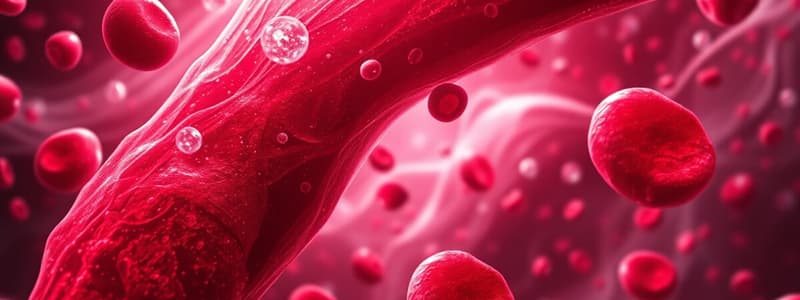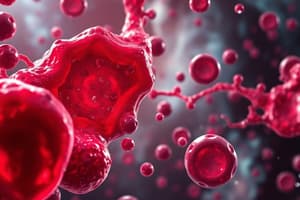Podcast
Questions and Answers
What is the primary purpose of administering Anti-D immunoglobulin to an Rh- female?
What is the primary purpose of administering Anti-D immunoglobulin to an Rh- female?
- To treat existing antibodies in the mother's blood
- To prevent the formation of anti-D antibodies (correct)
- To enhance fetal development
- To increase the chances of successful pregnancy
Which of the following is NOT considered a sensitising event for Rh- women?
Which of the following is NOT considered a sensitising event for Rh- women?
- Routine ultrasound check-up (correct)
- Miscarriage
- Ectopic pregnancy
- Termination of pregnancy
What special care is required if sensitisation has occurred in an Rh- mother?
What special care is required if sensitisation has occurred in an Rh- mother?
- Regular monitoring of antibody concentration (correct)
- No special care needed, normal check-ups apply
- Immediate delivery of the fetus
- Administration of antibiotics
When is Anti-D immunoglobulin typically administered to an Rh- female?
When is Anti-D immunoglobulin typically administered to an Rh- female?
Which of the following conditions requires monitoring for possible fetal transfusions?
Which of the following conditions requires monitoring for possible fetal transfusions?
Why do women who are Rh+ not receive Anti-D immunoglobulin?
Why do women who are Rh+ not receive Anti-D immunoglobulin?
What is the recommended action for an Rh- female following abdominal trauma during pregnancy?
What is the recommended action for an Rh- female following abdominal trauma during pregnancy?
How many donors contribute to the Anti-D plasma supply in Australia?
How many donors contribute to the Anti-D plasma supply in Australia?
What is the function of the ABO gene in blood group determination?
What is the function of the ABO gene in blood group determination?
Which blood group lacks any modification to the glycoprotein?
Which blood group lacks any modification to the glycoprotein?
What is the significance of anti-Rh antibodies in blood transfusions?
What is the significance of anti-Rh antibodies in blood transfusions?
What is the role of Anti-D immunoglobulin during pregnancy for Rh- mothers?
What is the role of Anti-D immunoglobulin during pregnancy for Rh- mothers?
What condition may result from an Rh- mother carrying an Rh+ baby?
What condition may result from an Rh- mother carrying an Rh+ baby?
How often are Rh+ blood types found in the general population?
How often are Rh+ blood types found in the general population?
Which of the following scenarios could lead to the sensitization of an Rh- mother?
Which of the following scenarios could lead to the sensitization of an Rh- mother?
Why is Anti-D administered during pregnancy?
Why is Anti-D administered during pregnancy?
What is the primary basis for determining blood group compatibility?
What is the primary basis for determining blood group compatibility?
What is the significance of the Rh factor in blood transfusions?
What is the significance of the Rh factor in blood transfusions?
In which situation is anti-D immunoglobulin administered?
In which situation is anti-D immunoglobulin administered?
What causes hemolytic disease of the newborn (HDN)?
What causes hemolytic disease of the newborn (HDN)?
Which event is considered a sensitizing event for Rh incompatibility during pregnancy?
Which event is considered a sensitizing event for Rh incompatibility during pregnancy?
What is a major risk factor for developing hemolytic disease of the newborn?
What is a major risk factor for developing hemolytic disease of the newborn?
What impact does the Rh factor have on blood recipients during transfusions?
What impact does the Rh factor have on blood recipients during transfusions?
Which of the following is true regarding blood group O in transfusion compatibility?
Which of the following is true regarding blood group O in transfusion compatibility?
Flashcards
Anti-D immunoglobulin
Anti-D immunoglobulin
A medication used to prevent the development of Rh antibodies in Rh-negative individuals.
Rh-Negative
Rh-Negative
A blood type that does not have the Rh antigen.
Rh Sensitization
Rh Sensitization
The process where an Rh-negative person develops antibodies against Rh-positive blood.
Ectopic Pregnancy
Ectopic Pregnancy
Signup and view all the flashcards
Miscarriage
Miscarriage
Signup and view all the flashcards
Antepartum hemorrhage
Antepartum hemorrhage
Signup and view all the flashcards
Haemolytic disease of the newborn
Haemolytic disease of the newborn
Signup and view all the flashcards
Anti-D immunoglobulin administration in Rhesus negative women (Rh-)
Anti-D immunoglobulin administration in Rhesus negative women (Rh-)
Signup and view all the flashcards
ABO Blood Group
ABO Blood Group
Signup and view all the flashcards
A Antigen
A Antigen
Signup and view all the flashcards
B Antigen
B Antigen
Signup and view all the flashcards
Rh Factor
Rh Factor
Signup and view all the flashcards
Rh+ blood
Rh+ blood
Signup and view all the flashcards
Rh- blood
Rh- blood
Signup and view all the flashcards
Blood Group Compatibility
Blood Group Compatibility
Signup and view all the flashcards
Blood composition layers
Blood composition layers
Signup and view all the flashcards
Haemostasis
Haemostasis
Signup and view all the flashcards
Blood clotting cascade
Blood clotting cascade
Signup and view all the flashcards
Erythrocyte production (haematopoiesis)
Erythrocyte production (haematopoiesis)
Signup and view all the flashcards
Blood groups
Blood groups
Signup and view all the flashcards
Blood plasma solutes
Blood plasma solutes
Signup and view all the flashcards
Reticulocyte
Reticulocyte
Signup and view all the flashcards
Safe blood transfusion
Safe blood transfusion
Signup and view all the flashcards
Study Notes
Blood Overview
- Blood is a fluid connective tissue, thicker than water and flows more slowly.
- Blood accounts for 8% of total body weight.
- Average blood volume in males is 5-6 litres and 4-5 litres in females.
- Blood temperature is 38°C, and pH is around 7.4 (range 7.35-7.45).
Blood Composition
- 55% of blood is plasma, primarily water.
- 45% of blood is formed elements: 99% red blood cells (erythrocytes), <1% white blood cells (leukocytes) and platelets (thrombocytes).
Blood Plasma
- Over 90% water.
- Proteins form 7% of plasma, mainly produced in the liver.
- Albumin maintains osmotic pressure
- Globulins include antibodies
- Fibrinogen is involved in blood clotting.
- Other substances in plasma include electrolytes, nutrients, hormones, gases, and waste products.
Blood Cells
- Red Blood Cells (Erythrocytes):
- Biconcave disk shape for increased surface area.
- Contain haemoglobin, giving blood its red colour.
- No nucleus, allowing more space for haemoglobin.
- Transport oxygen and carbon dioxide.
- White Blood Cells (Leukocytes):
- Granular leukocytes (eosinophils, basophils, neutrophils) and agranular leukocytes (lymphocytes, monocytes).
- Involved in immune responses.
- Platelets (Thrombocytes):
- Cell fragments involved in blood clotting.
Haemostasis
- The process of stopping blood loss (bleeding).
- Vascular spasm (constriction of damaged blood vessels).
- Platelet plug formation (platelets adhere and aggregate).
- Blood clotting (coagulation) formation of fibrin threads.
- Extrinsic and intrinsic pathways for clotting cascade.
Erythrocyte Production (Haematopoiesis)
- Occurs in red bone marrow of flat bones (sternum, ribs, skull & pelvis and ends of long bones).
- Haemocytoblast (stem cell) is responsible for all formed elements.
- ~100 billion red blood cells/day are produced.
- Erythrocytes live for ~120 days.
- Erythropoietin (EPO) is a hormone critical for erythropoiesis.
Blood Groups
- ABO and Rhesus (Rh) blood groups are significant in blood transfusions.
- Presence or absence of specific antigens on red blood cells determines blood type.
- Blood typing avoids incompatible blood transfusions.
- Mixing incompatible blood can result in agglutination and haemolysis.
- Rhesus (Rh) factor is another important antigen on red blood cells.
- Rh-positive or Rh-negative.
- Anti-Rh antibodies are usually not present, unless the person is exposed to Rh positive blood.
Haemolytic Disease of the Newborn (HDN)
- Occurs when a mother's Rh antibodies attack the baby's Rh +ve red blood cells, leading to anaemia and jaundice.
- Sensitization can occur during pregnancy or other medical procedures.
- Medical interventions can prevent or manage this disease.
Learning Outcomes
- Briefly describe the composition and function of blood layers as obtained by haematocrit.
- Describe the process of haemostasis and the clotting cascade.
- Outline erythrocyte production (haematopoiesis).
- Understand the basis of blood groups and apply to safe transfusion.
Studying That Suits You
Use AI to generate personalized quizzes and flashcards to suit your learning preferences.




